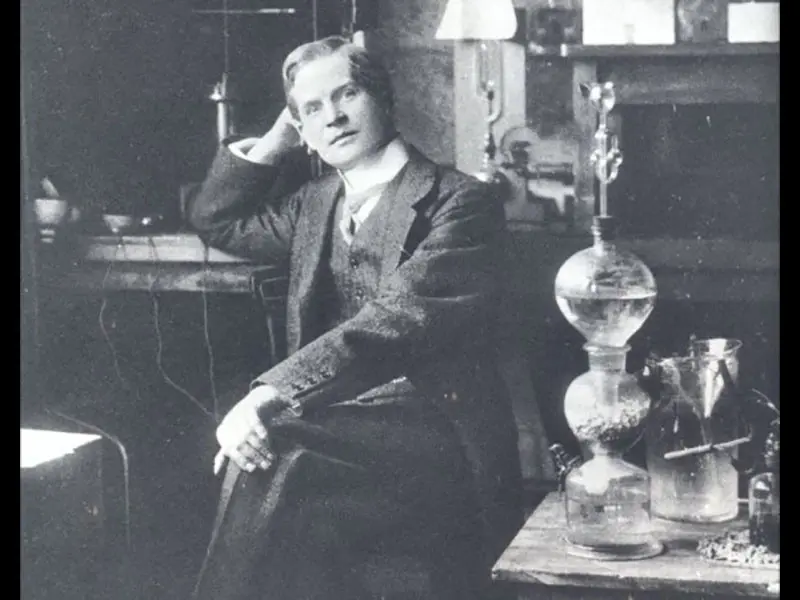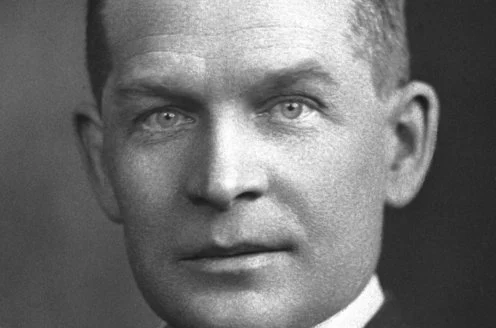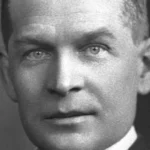
Frederick Soddy (1877–1956) was a brilliant British chemist and a Nobel laureate whose work helped establish the foundations of atomic theory. Yet, beyond the world of chemistry, Soddy was also a radical thinker in economics, a critic of capitalism, and a pioneer of what is now called ecological economics. He championed a new understanding of wealth rooted in thermodynamics, not abstract finance, and warned of the dangers of unsustainable economic growth and financial systems built on illusion. Despite his groundbreaking insights, mainstream economists largely dismissed his contributions—leaving his visionary ideas buried for decades.
Early Life, Family, and Education
Frederick Soddy was born on September 2, 1877, in Eastbourne, England, into a middle-class family. His father was a London merchant, and his upbringing was grounded in discipline and intellectual curiosity. Soddy excelled academically and won a scholarship to study at Merton College, Oxford, where he specialized in chemistry.
He was deeply influenced by the scientific revolutions of the late 19th century and became captivated by the newly emerging field of radioactivity. After Oxford, Soddy worked with leading scientists such as Ernest Rutherford in Canada and Scotland, contributing to a series of experiments that would shape modern physics and chemistry.
Scientific Achievements: Pioneering Atomic Theory
Soddy’s most significant scientific contributions came during his collaboration with Rutherford between 1901 and 1903. Together, they:
- Identified the transformation of elements through radioactive decay.
- Coined the term “isotope”—referring to elements with identical chemical properties but different atomic masses.
- Demonstrated that atoms were not immutable but could change form and identity.
In 1921, Soddy received the Nobel Prize in Chemistry for his work on the chemistry of radioactive substances and the origin of isotopes. His research laid critical groundwork for nuclear physics, atomic energy, and radiochemistry.
Turn Toward Economics and Social Critique
Despite his success in science, Soddy grew increasingly disturbed by the mismatch between the physical realities of energy and the abstract mechanisms of the monetary economy. In the 1920s, he turned his attention to economics, applying thermodynamic principles to finance.
In works such as “Wealth, Virtual Wealth and Debt” (1926) and “The Role of Money” (1934), Soddy argued that conventional economics misunderstood the nature of wealth. He distinguished between:
- Real wealth, which is physical and subject to the laws of thermodynamics (energy, resources, labor).
- Virtual wealth, which consists of money and debt that can grow indefinitely—but do not correspond to real-world limits.
He viewed capitalism as fundamentally flawed, with banks creating money as debt and economies growing in unsustainable ways disconnected from physical reality.
Criticism of Capitalism and the Economic Establishment
Soddy fiercely criticized capitalism, particularly the financial system’s reliance on debt-based money and compound interest. He believed that unchecked financial speculation, profit-driven banking, and the illusion of infinite growth were creating systemic economic and ecological crises.
He advocated for sovereign money, where governments—not private banks—control the issuance of currency, and for limiting debt to real productive capacity. These ideas would later echo in modern movements for monetary reform, post-growth economics, and green finance.
Mainstream economists at the time, however, ridiculed or ignored Soddy’s work, viewing him as an outsider meddling in a field he wasn’t trained in. His critiques were marginalized despite their foresight and empirical grounding.
Contributions to Peace, Socialism, and Community Service
Soddy was a staunch advocate for international peace, especially after witnessing the destructive potential of nuclear energy. He supported socialist principles, favoring economic justice, redistribution, and state responsibility over private monopolies.
He was deeply engaged in community education, delivering lectures and writing accessible books to empower the public with scientific and economic knowledge. He believed that a scientifically literate public was essential for democracy and sustainability.
Soddy’s views placed people and planet before profit—a stance that aligns closely with today’s sustainable development goals (SDGs) and degrowth movements.
Legacy and Relationship to Ecological Economics
Though largely forgotten in mainstream economics, Soddy is now recognized as a founding figure of ecological economics. His insistence on grounding economics in the laws of thermodynamics, particularly the second law (entropy), prefigured key ideas in systems thinking, energy economics, and biophysical limits to growth.
He warned that economies based on exponential debt and energy consumption were inherently unstable, and he called for a steady-state economy that respected ecological boundaries and prioritized real human well-being.
Modern thinkers such as Herman Daly and Nicholas Georgescu-Roegen acknowledged Soddy’s early influence in calling for an economy rooted in physical reality.
Thermodynamic Conceptualization of Money and Wealth
Soddy’s thermodynamic model redefined wealth as energy and material use, bound by entropy and decay. In contrast, money—when detached from real-world constraints—becomes a virtual abstraction prone to manipulation and distortion.
He argued that creating money without accounting for its energy costs leads to inflation, inequality, and environmental degradation. His framework anticipated today’s challenges, including climate change, resource depletion, and financial crises.
Conclusion
Frederick Soddy was far ahead of his time—a Nobel-winning scientist who saw the deep flaws in both physics-defying economic models and the capitalist obsession with infinite growth. Though his economic writings were dismissed during his life, they have since gained relevance in an era confronting climate change, inequality, and ecological overshoot.
Soddy’s call to align economics with thermodynamic and ecological principles remains one of the most visionary intellectual contributions of the 20th century—one the world is only beginning to understand.








